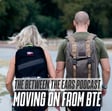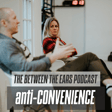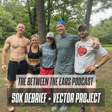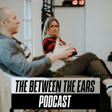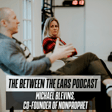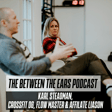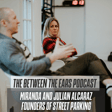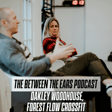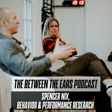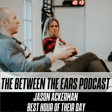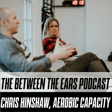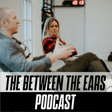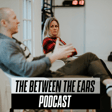Become a Creator today!Start creating today - Share your story with the world!
Start for free
00:00:00
00:00:01

Mike Giardina, CrossFit Health
Michael Giardina started CrossFit in 2005. He has worked as a trainer at a CrossFit affiliate and as a CrossFit Seminar Staff Flowmaster and Content Supervisor. He has competed at the CrossFit Games and served as a CrossFit Games Head Judge. He is a Certified CrossFit Coach (CF-L4), has a Master of Science degree in exercise physiology, a Master of Public Health degree, and works as CrossFit’s Senior Manager of Health Education. Mike is a student of life and a natural fit for BTE. This conversation is packed with nuggets of fitness, education, and life wisdom.
You can find Mike G on IG at mikeg_af and @crossfit
Please subscribe, comment or like and check out www.btwntheears.com for information on The Dose and upcoming seminars.
Transcript
Introduction and Mike's CrossFit Journey
00:00:00
Speaker
Welcome to the Between the Airs podcast. This episode, we have the pleasure of speaking with Mike Giardina, or as most in the CrossFit community know him, Mike G. Mike started CrossFit all the way back in 2005 for you youngins. Yes, CrossFit was around back in 05.
00:00:22
Speaker
Mike has pretty much filled every function within the space in the training and education side. He's worked as a trainer at a CrossFit affiliate, as well as a CrossFit seminar staff flow master and content supervisor. In the competitive side, he's both competed at the CrossFit Games and served as a CrossFit Games head judge.
00:00:49
Speaker
His accolades and letters and numbers and whatnot after his name are also impressive. He is a certified CrossFit coach, which is a CFL4. And he has two master's degrees because, of course, if one is good, two is better. He has a master's degree in exercise physiology and another master's of public health.
00:01:13
Speaker
Currently, Mike works as CrossFit's senior manager of health education, or as most in the space know it as CrossFit Health. Now, this isn't taking anything away from all of that, but what is really most impressive and respected about Mike G is not what he knows, but that he is a student and continually learning, someone who's been in the space for,
00:01:41
Speaker
you know, damn near 20 years, multiple degrees, undergraduate, graduate.
00:01:47
Speaker
practical application. Mike's a student of life. He's always learning and that's just inspiring, refreshing, and hopeful when you get to sit down and talk with someone like that. And it really is in this student of life mindset that makes Mike a leader in the space and frankly a natural fit for between years. There are very few out there with the education experience that Mike has. So to sit down with him and just have a good chat was like just truly special. Mike's an awesome dude.
00:02:17
Speaker
There are tons of nuggets packed into this conversation and it really was just an honor to sit down and talk with the Mike G. You can find Mike G on Instagram at MikeG underscore AF and for sure at CrossFit Health.
00:02:37
Speaker
If you find the podcast valuable, please leave a review. We also have a YouTube channel. So go ahead and subscribe where you can witness and visualize in person or digitally rather sometimes the awkward hellos. If you want to support and engage the dose is the best way to do that.
Promotions and Early CrossFit Experiences
00:02:55
Speaker
$9 a month for a weekly workout that will expand your mind, push your body, and provide material for the exact kinds of conversations and insights that we discuss with guests here on the podcast. So please check all that out in our new site at btwntheears.com for all the good stuff to include upcoming seminars, which Mike G will probably be at. So without further ado, here's the show.
00:03:53
Speaker
Hello. Hello. Hey. Hey. Here we are. Here we are. Mike, welcome to the Between the Ears podcast. Thank you. Thanks for having me on here. It's an honor. Awesome. Um, would you mind answering this question? Sure. Pre-question question.
00:04:22
Speaker
And you wonder why people are afraid of you or you don't have. Everyone's afraid of me. The people who are afraid of me are no longer here. Mike, who are you? Who is Mike G? Who am I?
00:04:49
Speaker
Well, we'll just start with, we'll start with what I do. How about that? All right. So, um, yeah, I'm, um, I work for CrossFit and that's, you know, how we know each other. Worked there since, geez, 2007 ish. It's kind of the entry point into employment with CrossFit. Wow. Yeah. Um. Was that as a level one person or?
00:05:13
Speaker
That was like interning, like the old school interning. So done with my own level one training at CrossFit Atlanta. The experience at the level one was like, oh yeah, I think like 2006, right? When I went through just fitness was way different. I mean, it's way different than it is now. I mean, a lot of changes have taken place and CrossFit and, you know,
00:05:40
Speaker
functional fitness, whatever you want to call it, is extremely mainstream, and you see it everywhere. But back then, you just didn't, right? And so Greg was instructing and lecturing at that seminar. And I remember leaving and just being like, my mind is blown. I was in school at that time. I was in school for my bachelor's in exercise science.
00:06:08
Speaker
and kind of went against everything that I was being taught at the time, but it made sense. As much as it could, don't get me wrong, Greg talked way over my head a few times, but even that was pretty awesome. So anyways, the experience was amazing. And I went back, I started training at CrossFit Atlanta and coaching there and everything. And I was like, man, I want to be a part of that experience. So Dan, the owner of CrossFit Atlanta, had a good relationship with Greg.
00:06:38
Speaker
And he would, you know, because back then affiliates were small and they just weren't, they weren't everywhere. So Dan would help out in the Southeast seminars, which would happen like once a month, you'd have like one seminar back then that made it to the East Coast or Southeast. And he'd help out, he'd bring medicine balls and barbells and like whatever he could bring. And so I started going with them to help. And
00:07:07
Speaker
I honestly didn't realize I entered an internship process. I just like was involved and I really enjoyed it. And like, I started getting like smaller tasks. Like, Hey, do you want to run the pull up station? You know, and that kind of stuff. And then all of a sudden they're like, Hey, we want to build an East coast team. Like you want to do this and get paid for it. I was like, well, it sounds amazing.
00:07:36
Speaker
And in 2008, I was employed and traveling around the world to seminars. I think I did over 400. Which was an experience that I wouldn't trade for anything.
00:07:56
Speaker
it did get to the point with travel and hotels and airlines and all that kind of stuff where I was like, man, I just can't do this anymore. I couldn't be away from the kids anymore. But there were some years where like in places I got to visit and people I got to meet and cultures I got to experience that you just, you know, and all while talking about something I'm super passionate about and that could potentially
00:08:21
Speaker
have this trickle-down effect that really changed a lot of lives. So it all just is amazing, actually.
Bridging Healthcare and Fitness
00:08:28
Speaker
Yeah, it's cool. It's cool. A lot of people travel for work, but I think what's unique about traveling for CrossFit in the seminars is you're immediately immersed and welcomed into the locals and the culture. Whereas if you're traveling for work and you're bumbling around like, ah, I wonder where we should go to eat,
00:08:46
Speaker
CrossFit, you're already like, you're experiencing everything in like a very hometown kind of way. And that's, that's probably like pretty unique. I mean, some of my best memories of like dinners were like going to, um, uh, going to Argentina and then just eating like a whole bunch of
00:09:14
Speaker
like steak and meat and drinking wine at Paolo's house. And he had this massive brick grill in his backyard. It was huge and just threw a bunch of meat on there and had some good Argentine wine and just sat there and just talked to all his people and the people from the gym.
00:09:39
Speaker
And it was amazing. It was such an awesome experience. So yeah, that was great. And then once that, I don't want to say ran its course, right? But things run their course. So you can just get to the point where you're like, it was great. I just can't do it anymore. I always said at that point of seminars, if I could do local seminars on Tuesdays and Wednesdays,
00:10:07
Speaker
I could potentially do that for the rest of my life. You know what I mean? But the kids are playing sports and you start losing weekends and then you get delayed and cancellations and all those different things that they add up. So that's all I got into more of like the content and education side of CrossFit.
00:10:32
Speaker
which eventually kind of morphed itself into what it is now, where I entered into CrossFit Health because CrossFit Health had changed directions from its inception, which was really dealing with the mess behind, you know, research, pharmaceutical industry, big soda, all those other big corporations that kind of were infiltrating research into something that now is what we consider
00:11:02
Speaker
bridging the gap between healthcare and fitness, which is essentially educating
00:11:10
Speaker
healthcare professionals, not just MDs, really any healthcare professional about the efficacy of lifestyle changes like CrossFit and nutrition, sleep, stress management, all those different things and how that is true healthcare and improving health versus like treating sickness. But with that education and exposure to CrossFit and community and those types of things and healthcare professionals and MDs,
00:11:37
Speaker
they can use that and actually educate and create action with their own patients, which has this cyclical effect into patients experiencing CrossFit in one way or another, and then hopefully making their way into the affiliate, and then having the life-changing experience that we've seen a lot of people have. But then also taking a lot of what we're learning from these healthcare professionals and MDs, and then, you know,
00:12:05
Speaker
finding the right mode of communication and language to provide that to coaches and affiliates so that they can use that with their athletes, right? And the people that walk in the gym. So let's say it's a, it's a cool reciprocal relationship that we're creating here. We kind of see ourselves as the middle man. And that's the idea behind CrossFit Health and like kind of where we're going. No,
00:12:32
Speaker
It is, it is also like a cool resource just from a end user, like random person, right? Like to tackle that you guys, you know, CrossFit tries to, big CrossFit, I feel like tries to provide resources for affiliates in this bigger way. And it's definitely addressing all the things that are becoming more mainstream, like the Huberman, the Chris Palmer, like all these,
00:12:59
Speaker
things that maybe all affiliates aren't sitting around listening to Huberman or Peter Attia, but from a CrossFit source, someone they trust, like there's some education around like, yeah, it's your point, sleep, stress, health, nutrition, not just so, it's, it's non dogmatic in many ways. And I've appreciated seeing like the, the breadth of what you guys put out. It's not, yeah, it's not so singular. And I think that's very healthy for,
00:13:27
Speaker
for the CrossFit community to see. Yeah. No, that's awesome. Yeah. Sorry. No, no, no. No, I was just going to say, honestly, I started helping with content and health about a year ago. And that was really our goal is to, how can we make a lot of this information more accessible to the community?
00:13:56
Speaker
So yeah, it's cool to hear that that was the... Well, we hit that result, so that's awesome. Yeah.
00:14:09
Speaker
What have you learned from the healthcare professionals, from the MDs, from the NPs, whomever are kind of, you know, you used to talk about this reciprocal relationship, which I think is like a really awesome way of describing it. And I'm curious, like, what have they taught you? What have they taught CrossFit so that you can, you know, continue to do the mission of CrossFit and CrossFit Health?
00:14:35
Speaker
Well, I mean, there's a lot, right? And it can get very specific. You know, I think of things like, you know, we talked about Chris Palmer just now. I mean, you think about, I mean, you know, there's, there's a ton to learn in something like mental health in how
00:14:56
Speaker
maybe the way that we've thought about it for so many years provides some explanation, but not all of it in that there might be something that links all these explanations together, like, you know, metabolic health and mitochondria, which when you, when you, when you take something like metabolic health and mitochondria,
00:15:18
Speaker
You can make that accessible and understandable to, not to say, and I don't want to talk down, I'm not saying this in a way like talking down to affiliates or coaches. I don't mean accessible and understandable because they don't understand mitochondria and metabolic health. I mean speaking their language in terms of what they can do to affect these areas as trainers or affiliate owners. You know what I mean?
00:15:44
Speaker
Um, and then how, how, what does that affect? You know, what is that effect on, on not only physical health, but mental health? So, you know, there, there's really cool things like that. You know, I think when you, a lot of the nutrition stuff, um, comes to mind, I think about what you can learn from healthcare professionals. Like Dr. Roberts, uh, side has, has some really amazing things on, um,
00:16:12
Speaker
you know, carb addiction, and some of the mindset behind making, you know, with his practice, it's nutritional changes. But when you talk to him, you know, you can very easily see how this applies to any type of behavior change that we're going after here, right. So
00:16:32
Speaker
you know, those are two that come to mind very quickly. And you know, I can probably tap into, I mean, jeez, you know, I just talked to Lane Norton, and Alan Aragon, who, you know, they have similar beliefs in nutrition as CrossFit, but not completely. So I mean, there's a lot to learn there too, like, hey,
00:17:00
Speaker
What is really the most important part of nutrition? Does everybody fit in the one bucket? Is it, hey, at the very least you need to make sure that you're getting the right amount of proteins and then as long as the carbon fat sources are from good sources, then they kind of washed themselves out and you can play with those really based off of
00:17:27
Speaker
your own goals, right? If it's like maintenance goals, weight loss goals, maybe the carbs go down and fats up as long as your protein hits the right amount. Or if it's performance goals, okay, well maybe fat goes down a little bit and carbs go up to support performance. But you know, there's a protein intake that
00:17:42
Speaker
that everybody should be having or a range that everybody should be having. So there are things like that where you learn from it. It makes you think a little bit more, makes you think outside of the box, makes you explore different things. I'm not going to say it necessarily makes you change your message right away.
00:18:01
Speaker
But it it forces you to take the time and open your mind to changes. Right. Like, hey, maybe maybe we can change something. And, you know, one of the things that and I know I'm kind of rambling here, but one of the cool things about nutrition after talking to so many people, whether it's like, you know, someone who's carnivore ketogenic diet, a little bit higher carb, like Elaine Norton or Alan Aragon or, you know,
00:18:30
Speaker
you look at the CrossFit nutrition recommendation, you're like, wow, it's pretty solid. Like it hits everything. You know what I mean? Like, hey, eat good food and then find out the right amount and ratios that work best for you. Like how do you, how do you change that? You know what I mean? Like it's, and it's like the thing you talk to anybody and there's,
00:18:56
Speaker
even the people who have the, there's no bad food belief will still say things like you need to watch processed foods because of, maybe it's not for the same reasons. Maybe it has, maybe they don't think it has anything to do with insulin or those types of things, but you definitely have a higher chance of overeating. And if you overeat and then you have too many calories and that can go into the energy ball. But it's still the same thing, you know, it's like,
00:19:24
Speaker
the bulk of your food should be whole foods, natural foods. So it's cool, it's cool. When I think about everything I've learned in nutrition, through talking to all these people, I wouldn't change anything that CrossFit recommends, but you just learn that, hey,
00:19:43
Speaker
Everybody has different needs within this umbrella of this recommendation, right? Yeah. And it is cool that the understanding is you do need to experiment and it's not... Totally.
00:19:59
Speaker
Yeah. And like, here's the constraints, the sort of guidelines.
Exploring Nutrition and Education
00:20:04
Speaker
And, you know, and I think that is something that generally does happen with, you know, the CrossFit community is looking to, um, yeah, optimize more than maybe other, like as a whole, they want to do that work and tweak things and try things. And that's really cool to see. So yeah, experimentation. There's so much to be gained from that. Right. I mean,
00:20:28
Speaker
I tend to go back to a standard way of eating that works really well for me, but I will experiment with things just to see. I did three months of carnivore.
00:20:44
Speaker
which was cool, but it just wasn't my thing. Nothing wrong with it. I've seen it work really well for people, but for me, it just was not great. But doing that experiment, I was talking to a member of ours today.
00:21:01
Speaker
you know, Peter Attia has a new book out and he was saying that he wanted to do the nutrition chapter to just be like a page. And it just was like, these are the only things we actually really know about nutrition. And so it's kind of interesting, like there are a handful of things, but the rest is sort of individual or experimentation or, you know, what you're dealing with. But what is interesting, I mean, I've done,
00:21:30
Speaker
vegan, I've been a vegan, of course, I've gotten some recently too, which was Yeah, it wasn't that long ago, I've gotten as you can get it when you were younger, at least you'd be like, Oh, well, you were young, right? Yeah. And you can imagine some of the people that might come to mind in our, you know, shared circles that maybe gave me some
00:21:49
Speaker
clock for that. But I tried it for like a year. It was during my Ironman training. So I kind of was just like all the way on that side. And like, I don't regret it. Like it was an interesting experiment. And I can now speak to like, I've tried that. I've done that. Similarly, like we've been doing the ancestral thing, like a little more
00:22:15
Speaker
meat, fruit, it's just cool to try that and say this was something that I gleaned from it and I'm going to take on and put forward in how I eat and this is something I didn't work for me and leave that behind. So yeah, that's really cool. Yeah, that's interesting. I laugh, but I've definitely toyed around with the idea of
00:22:42
Speaker
going vegan for the experience, right? Because it's one thing to talk about it, but it's another thing to experience it and then have those talking points to kind of back it up. And like you said, you might learn something from it. You know, even with the carnivore thing, it's not for me, but I did realize, okay,
00:22:59
Speaker
eating more meat, having a higher level of protein. I didn't need as many carbs to support what I was doing. I actually do pretty well on a low to moderate carb, even with volume of training. It doesn't affect me that much. So there are things that you still walk away from.
00:23:16
Speaker
Even if the experiment itself, or you don't continue on with that experiment, there is still success in learning from it. And either learn from it and say none of this word from me, or learning from it and say, hey, there are a couple of things that I can move forward with.
00:23:33
Speaker
Yeah, yeah. Yeah, that notion of learning, like, what's awesome, too, is that that's you were in were you in your undergrad or math or graduate for your exercise science? While while working for CrossFit. So I finished up my undergrad, and then got my master's while traveling around. And I mean, it was like the perfect opportunity, right? Like you just
00:24:01
Speaker
work on weekends and then I can go to school all week. And then so I got a master's in exercise science. And then years later, once I came out to California, ended up getting a master's in public health.
00:24:16
Speaker
Oh, wow. Yeah, cool. And I think that's what's really neat about your journey hearing it that you were getting your undergrad in exercise science, which like no shortage of doctors and letters and names and labs and all of that, you know, textbooks and big words. And then you, your mind was opened by the level one and this thing, which is not long words and
00:24:43
Speaker
craziness, but an elegant, uh, an, an elegance and a attractiveness to, Oh, I can actually, we can actually do something with this. Like I remember teaching a level one, I don't know where it was Virginia beach, maybe. And the dude was a masters of exercise science. And he's like, we have still yet to learn how to squat. And he was like, my squats Cooper or whatever. And I was like, yeah, I know. Like, look, I didn't get my masters in exercise science. I don't, that's not my background. So like, I'm not, I don't,
00:25:12
Speaker
I feel like I can't really have an opinion here, but as someone who's- He meant in his education at that point, he had not yet learned how to squat. Okay. I was just clarifying because it sounded like- So yeah, here he is getting his final semester of master's degree. He's like, we still haven't actually taught anybody how to do anything. It's been limited to labs and words and pages.
00:25:36
Speaker
I was like, yeah, you, there's a lot of value there, but like, whereas you might've read a thousand pages, we've sort of taught a thousand people. And so, you know, bringing them together, um, and hearing your, you know, passion for learning and your mind opening, I could imagine where perhaps many of your classmates at both the undergraduate and the graduate level, if you didn't defend the crown, you know, it's like, oh, you got to defend the crown and
00:26:07
Speaker
and not have anything that flies in the face of it. But the thing that flies in the face of it is the little wedge of, well, let's see what else there is. And that notion of curiosity leading to learning and continuing that as really like part of the just ethos of living in life is really cool. And now to see, you know, however many years, 15 years later, in a position of like,
00:26:37
Speaker
influencing that for for others so that they can continue to learn both on the medical side to the affiliate side to anybody who you know basically can improve through through movement uh is really that that's that's really cool to kind of in my mind I'm seeing like this trajectory this art of your of your journey that's sweet no I appreciate that it's it is interesting um because I started my my bachelors because I wanted
00:27:06
Speaker
teach and I wanted to teach in academia and I wanted to do research, right? So, um, but yeah, so, you know, going to level one, it just kind of, it opened everything up and didn't really change necessarily what I wanted to do yet. It was actually during my, my master's program. Um, I will say I would totally agree with the, um, the participant you had talked to because really, I mean, I did take like a, like a weightlifting kind of course, but,
00:27:35
Speaker
We weren't really taught how to even move much, but definitely not how to teach people, right?
00:27:43
Speaker
And the master's degree was highly research-based, a lot to do with the different machines, devices, and things that we used, as well as manuscript script writing, which I will say there was a lot to be learned with improving writing skills and those types of things.
00:28:06
Speaker
But the other part of that is out of the entire master's class that I went those two years with, I can't pinpoint one of them that went on to get their PhD and actually teach and continue research. So what does that mean? It means that the rest of them somehow went into industry
00:28:35
Speaker
in likely fitness without the ability to really teach coach fitness, right? So it's a very, it's a very interesting, super interesting that
00:28:48
Speaker
A lot of these master's programs are directed towards this tiny, tiny percent of students that actually move on and do research. You know, the other part of that, though, is like I felt pretty lucky to be involved across it at the time because there was a lot that I learned, you know, by either doing research or studying it, whatever it is, that I could apply and see like, wow, this is
00:29:19
Speaker
potentially how and why CrossFit works so well. So that was pretty cool and it definitely helped with the learning of the material.
Mindset and Mental Challenges in Workouts
00:29:30
Speaker
The other thing that was really cool is my professors were very open-minded. Some of them thought I was crazy for doing it, but if I wanted to do research on it, they're like, yeah, you should. In fact, one of them, Dr. Yuri Fado, helped
00:29:48
Speaker
you know, he came in after I was already started my master's degree. And he had started doing CrossFit and also, you know, got the bug, right. So we took the biomechanics lab and turned it into what looked like a mock affiliate. And a lot of the research that came out of Kennesaw State until he left was CrossFit based, which was really cool. So even though
00:30:19
Speaker
There was some dogma. There always is in academia. There was an open-mindedness that I appreciated at that university and throughout that department. So that was cool. But I will say also with my goal to teach and educate, man, once you kind of go through
00:30:46
Speaker
teaching at level ones and level twos, you have a chance to teach at academia. And you go in front of 50 people that are 100% focused on what you say. And they're in it and they have great questions. And then you're in the lab class and you're teaching 30 people and two of them are looking at you and 28 are on their phone. You're like, yeah, I'm good.
00:31:09
Speaker
Yeah, fulfill my goals to educate on this stuff. Better elsewhere. Elsewhere. And that's how you know, and it's kind of morphed into into this thing. And yeah, it's cool. I mean, the ability to work
00:31:32
Speaker
and feel like I'm educating or helping create education for healthcare professionals and doctors is like, I mean, jeez. It's cool. It's amazing.
00:31:47
Speaker
So you guys recently did a little interview with Bill for CrossFit Health, and that was more mental health focused. But you have done one of our mindset workouts. Mind-opening workouts. Mind-opening workout.
00:32:07
Speaker
Which is, you know, it's kind of cool to have you go through that since you guys talked about things and kind of to our point of like studying the pages and talking about the theory and then maybe experiencing something. And I think that's what's the most challenging in the space of what we do with these sort of bringing fitness and mindset together is
00:32:32
Speaker
The quote, I think it was something that we said pretty regularly at CrossFit seminars when people would ask, well, tell me what CrossFit is. Tell me what it is. Just describe it to me. I want to know. The answer was just show up at 10 o'clock. You can only describe and articulate something to a certain degree, and then the rest is experiential.
00:32:56
Speaker
You were dosed, as we like to say, with one of Bill's workouts. Hour workouts. It's hour workouts. That's right. Most of the time, I'm part of the experimentation process where I'm fallen told to participate, see how things go. I like that. It's funny. Yeah. But yeah, so tell us, you did
00:33:24
Speaker
I think last week's, which was the mindset was stick with it. No, see it through. That's what you did, right? So tell us kind of just whatever you feel like sharing, like how was that? How did it go? What was that experience like for you? And do you do workouts like this? Have you done something like that before? Okay, yeah, let's start with that. So
00:33:54
Speaker
One of the things that I realized is that
00:34:02
Speaker
This level of thought, because I was going through this, I really tried to pay very close attention to the thought process that went on throughout the workout. So from the start, minute to minute, let's say round around, minute to minute, round around, but then 15 minutes in, different checkpoints.
00:34:27
Speaker
And I do think the one-minute break really gave me a chance to settle down a little bit and take some time to think about it, which was really cool. But one of the things I noticed is that this level of thought tends to happen in almost every workout
00:34:51
Speaker
that I do. I'm just usually not as aware of it. One of the things I used to always tell people when I was working out is I didn't like loud music.
00:35:05
Speaker
I don't like fast music. I didn't like these things that distracted me from what was going on and what I had to do to finish the workout the way I wanted to finish it. And I felt like loud noises, somebody in my ear counting down 10 to one or three to one and telling me to go was very appreciated, but it was very distracting.
00:35:33
Speaker
So my point was like, so I think this stuff happens pretty naturally for me and probably a lot of other people out there, but what this workout did is, okay, now let's be really aware of it. And that's what I got out of this. And, you know, it's interesting, like, because the parallels of the thought process and the actions in a workout like this to
00:36:03
Speaker
instances in life where it's very interesting. It's super interesting. And you can tend to see this, I mean, and this is my experience, but you can tend to see this quite often in a lot of different endeavors that you go after in life where it's like, you're excited,
00:36:24
Speaker
You're all in. You're all in in the beginning. Let's throw 100% of everything I have into this. I'm going to sell out and get this thing done. And then in this particular workout, I'm a quarter of the way in. And it's not super difficult yet. But I'm like, whoa, whoa, whoa, whoa, whoa. Let's pump the brakes a little bit because there's a lot left here. And now I can start to see.
00:36:53
Speaker
Okay, what's happening? I'm getting a little bit of a stimulus behind what's going on here. And I'm starting to realize I need to make an adjustment. The course I'm currently on, I'm giving too much of myself.
00:37:15
Speaker
right now. And if I continue to do this, I will completely break down and never see it through, right? Like I need to pull back a little bit, take this assessment, see where I am, and then potentially adjust the course, you know, and, and, and that's what I had to do. And like, you know, about a quarter of the way into this thing is, okay, how do I conserve energy? And it ended up getting to this point where,
00:37:43
Speaker
every minute off, I would assess like, okay, what was that feeling for that round? How can I give just enough to complete the next round? Right. And, you know, in the beginning it was like, Hey, do burpees as fast as you can. And then it was like, whoa, whoa, whoa, whoa. Like you got a long, this is a long road here. And if you give everything you have too early,
00:38:13
Speaker
Like you're not going to make it, you know, especially with, with the goal. Like my goal was to finish. I wanted to do the 20 burpees. That's what I wanted to do. You know, I felt pretty good that morning. I did. Yeah. Nice. And it became, and it became, but because I, you know, and it's one of those things too, you know, this other part of it is like, Hey, I started the workout with, with no real thought.
00:38:40
Speaker
of prior experiences, of learned experiences. It was just, hey, excitement, let's go, you know, let's do this. And then, you know, within the first quarter of it, it's like, wait a minute, well, let's think about where other workouts, other
00:38:59
Speaker
experiences I've had like this and start to play this out a little bit. Because if I keep it up this way, I've gone too hard on a workout and imploded and couldn't finish. Those things have happened. So tapping into those past experiences and changing course and how I thought about completing it,
00:39:25
Speaker
was a game changer. And like I said, it was just like, hey, this next round needs this much extra effort to complete. In my head, though it was the accumulation of burpees was a lot, the thought was like one more. How much effort do I need to complete one more?
00:39:46
Speaker
It's interesting that you went out with a goal, like you said, I want to do. And that's what's kind of cool about some of these. It didn't occur to me to have a goal on how many burpees. It was just sort of like, see what happens. But to your point about life, it's just a funny parallel to different things and how you experience them.
00:40:15
Speaker
I did a my experience was when in that initial 15 minute timeframe, there was a lot of like, looking back like maybe, maybe the sleds too light, maybe the sleds too heavy, maybe I should be going up by twos. And then it's like just, just
00:40:32
Speaker
hang on like kind of the same thing, like just sort of pump the brakes in a way of like, okay, let's not make these decisions. Like all of a sudden be like, okay, I'm just gonna go up by Tuesday. I'm going to put more wheels. I'm going to take my way. Um, but I got to the halfway, I decided somewhere in 10 minutes, 15 minutes at the halfway point, I will start going up by two. Um, so there was sort of like a, I guess somewhat of a little goal, but then it was like, we'll just see what happens. And to your point of imploding, um,
00:41:02
Speaker
Yeah, I hit 19 of 20 and then from there it was like, I think I saw 18 once more and it was...
00:41:10
Speaker
you know, I was thinking, oh my God, like, this is like a whole different, 59 minutes ago, this was like a joke and now I'm barely clinging to the, to the workout. But it's, it is just so fascinating how people can approach these things with the same constraints very differently. And some of the point of this workout was also choosing, like you have a choice in something, so.
00:41:36
Speaker
Yeah, and you guys talk a lot about that, right? Like with, you know, this idea of agency, like, hey, there's, there is that choice that control over what you do, but also what the result of that is, right? Like, what are those consequences of what you do? And yeah, you know, like, it's funny, you said like, with a goal, I
00:42:02
Speaker
There are definitely workouts I go into with, without a goal, but I would say that most of the time there's some goal and the goal isn't always like, I didn't know if the goal was going to be 20 on this one. Um, because, you know, I had seen this, you sent this to me, you know, how far in advance it was, it was quite some time. So I had time to think about it and you know, you know how it is like 42 some days I wake up and I'm like, let's go. And a lot of the other days I'm like, eh,
00:42:31
Speaker
is in at 85%. You know, got to wake up again tomorrow. But I felt pretty good. I felt pretty good. And I was like, Okay, burpees aren't my favorite. But it's like, I'm gonna go after this one. Yeah. And it's interesting, because that's how you kind of sometimes how it is with life and a goal, right? Like you have a goal. And before you really think it through, you come up with
00:42:58
Speaker
strategy that's really going to get you to that goal. You just, you go all in and you're like, whoa, whoa, whoa, whoa, whoa. Like, I still want to get this goal, but I need to have enough. Like if I give everything to achieving it, I might give so much, but by the time I get there, like look what I've lost, right? If I get there, look what I've lost, you know, friendships,
00:43:24
Speaker
you know, whatever, you know, family, you know, there's, there's all kinds of things that people tend to sacrifice in order to achieve a goal. You just got to weigh it out and say if it's worth it. Right. So, and that's where you burn out before you get there or you burn out before you get there. Right. For sure.
00:43:44
Speaker
And that was a lot of the thought here within the workout. And I will say I didn't get super philosophical in the middle of the workout. It was always about the workout. So when I started thinking about these things, it was about completing it. And then afterwards, I was like, wow, this is when you can really start making those connections.
00:44:08
Speaker
And it was a little bit after it wasn't right after right after I, you know, I look at my notes right after I kind of just talked about the thoughts to complete it. Like, I knew I had to get to 18. I knew that's where at 18, I knew
00:44:28
Speaker
it was going to get super difficult and there needed to be a new strategy. And at that point, I mean, the only strategy I had was like, you can't think about anything else. Like the entire sled, every step, all I repeated was the number that I had to do for burpees. And I just said, 18, 18, 18, 18, 18, 18, until I stopped, you know, about 20 seconds of break.
00:44:54
Speaker
I do the same little pattern of walk, put my hands on my knees, wait for the three, two, one countdown, and then go. And I always counted down, burpees were always counting down, seeing, because there's always some kind of visual aspect.
00:45:12
Speaker
at least for me, when, when there are numbers involved, like in workouts, right? When I'm so it's for me, it's like, it's a visual, almost like this road that could just rotating numbers down, you know, 70s, 60s, 50s. I don't think I have the mental agility to count down. Like I would think about, I think I would get lost somewhere in there. Really? But who was there was some,
00:45:42
Speaker
therapist person, I don't even know, doctor who was talking about the, and Bill might remember, like not counting to 10, like counting to uneven numbers. It was like an exercise science, psychology kind of thing, like going to seven or nine and like how, because you have these predetermined, like, like 10, like what five is like, what 10 is like, and like, I don't know. But
00:46:10
Speaker
I listened to that and I thought, yep, that's me, like 10. Okay, got to 10, now it's like, you know, five, but that's interesting that you have that data counting down backwards.
00:46:23
Speaker
Yeah, and if the number's big enough, I'll pyramid up. But I always want to finish on the way down. So if it's 21, you get 21, 15, 9, workout. I actually count to 11 and then 10 down to 1. Uh-huh. Interesting. Wow. OK. We're learning. Yeah, this is good. So when you say, who are you, this is all part of that answer.
00:46:46
Speaker
The next workout I do, I'm probably going to try that and then be like, what the fuck? Why is there an F in there? Is there a letter? Yeah, I mean, I think for me when I did it, I had, well, if I'm being completely honest, I saw it and I was like, I'm not going to be able to do 20 in a minute. I'm pretty sure that's going to be beyond my herpy capacity. So I wonder if I were to redo it,
00:47:17
Speaker
with that goal of let me actually set a goal and work for it, which means that that might be I come up short and I have to deal then with that disappointment or the humility of whatever versus I'm just going to write myself off before I even do it and find this and it's not necessarily right or wrong, but like find this celebration, which I think is helpful for sometimes of like, well, that's cool. Like I got close, you know, versus like,
00:47:46
Speaker
the disappointment of not hitting the goal, which is part of actively living in life too. Like, yeah, there's going to be stuff that we might not always get to. But I had an interesting thing where it was like two minutes in,
Physiology, Psychology, and Life Lessons
00:48:02
Speaker
right? And I'm thinking,
00:48:03
Speaker
I could literally be doing anything else in the world right now and be getting a better workout, you know, because this is funny. Cause it's like, you know, that's not the point necessarily. I mean, yes, it's a workout, but you know, that wasn't the purpose. Listen, I'm not saying what goes on up there is, is, is good. But, um, you know, and then like around like the 40 minute mark, it was like, all right, this is, you know, this is, this is, this is real now. This is, this is definitely real. And I had this thing of like, at what point do your choices,
00:48:34
Speaker
which was part of this was an empowering workout to say, Hey, make a choice, go through it from the weight on the sled to, you know, perhaps interval of the burpee and whatnot. But like, at what point is your choices kind of morph and change into your excuses? And that for me was a cool like little bit of awareness of like, Hey, you chose to do this.
00:49:05
Speaker
Yes, it's tiring. Like, yes, it's difficult. And maybe with a sled weight, like, okay, this is what you chose to put on. But like, that's not the excuse to justify the reality of perhaps the effort. It's just the choice you made and having a little bit of honesty with that and checking myself of like,
00:49:36
Speaker
how convenient the excuse is when really it's just you chose this. You know what I mean? And for that, I was like, all right, that's cool. That was- Yeah. To your point, the thinking, during the workout for sure,
00:49:53
Speaker
I think it's for most people, it's about the workout. But I do like the journal prompts, which sometimes resonate some more than others with people. But it's kind of a good, I like them because they do provide a little bit of reflection and connection to something greater than just the workout, which otherwise maybe you wouldn't have that opportunity
00:50:23
Speaker
I guess that's part of the physiology and psychology of it. Having moved your body and experienced that process connects it in a more real felt way than just if you were to sit down. If it was just like a book of these mindsets and all you did was read them and do journals, that would probably be valuable. But there's something about having gone through something that you experienced that
00:50:51
Speaker
that kind of thinking. I don't know how to articulate that, but yeah. I think what's interesting with both the points you just made, you know, one bill with the point you made, it just reminded me, it's not exactly the way you described it, but when I was training really hard and I was on a team in CrossFit Atlanta, you know, we're going to the games and stuff.
00:51:18
Speaker
We used to have this thing where if somebody pulled out a weight vest in the workout, we'd be like, oh, so you just don't want to go hard today. Because you're making this choice so that you can use it as an excuse later on. That's what you're doing.
00:51:43
Speaker
That's okay. You can do that, right? But that's why you're doing it. You know, like everyone else is doing the workout without a weight vest.
00:51:53
Speaker
You don't want to push yourself. You want to use it as an excuse. So put the weight vest on and then pull back and you can use it. Like that's okay. That's okay today. We'll take it. It was just a funny, like as soon as you were saying that, I'm like, Oh yeah. And listen, I was, I did it. You know, there were times when I did it too. It was one of those things where it was a joke, but it was definitely something that if you didn't want to push, just put the weight vest on and you know,
00:52:23
Speaker
You know why, but it's okay. You could wear it. And then, you know, the other part, which is interesting in the workout, Karan, that you talked about, it was like in the middle towards the end, man, those rest breaks became so important. And
00:52:51
Speaker
because the other two minutes became very stressful, right? I mean, the sled wasn't terrible, but it got hard. And it got hard because you were torn between push harder and get more rest
00:53:08
Speaker
or don't push as hard, but now you don't have as much rest for the burpees. And I couldn't decide like, am I wasting energy by pushing harder and trying to get more rest or slowing down? Is there more friction? And these are the thoughts that are going through my head, the sled sometimes. But anyways, my point was like those two minutes became very stressful. And that one minute to take that high level of stress
00:53:38
Speaker
and find a way through breathing and not moving and just being there was so important. And I was watching my heart rate quite a bit and I'm like, hey, am I doing what I need to be doing to prepare for this next round, right? And it was like, there became this pattern because I had to push down and back. So I had to switch the,
00:54:03
Speaker
the posts, the poles for the sled. So it was like, it became this like, you know, pull it up, pull it up, right hand goes into this one, turn around, go to this one, put my hands down and then push. And then when I got to the other end, it was the same thing. Sit down on the weights, start breathing, you know, take this chance to feel where I am, how I'm feeling, how much more can I push to just complete one more burpee?
00:54:32
Speaker
And it's like, man, like that's, you're talking about like the psychology, physiology, say it again, the physiology of psychology. How do you? Yeah, the physiology of psychology. Yeah. So when you think about it that way, I mean, you know, maybe that maybe not that amount of stress, but you're, there's so many points in life where it's like things get freaking stressful. It's like, but you know, you can take that minute.
00:55:03
Speaker
Find ways to calm yourself down and think about how can I get through this next point? And whether it's, I mean, the cool thing about a workout is you get to feel it real time right there. Like, you know exactly what's going on. Um, and sometimes you don't have that, you know, you don't have that same physical feeling in some of these other life stress, but internally, like it's all there. And, uh, the,
00:55:35
Speaker
the process of checking in with yourself, calming everything down and then making that next plan to move that one step further. It was like, Hey, you can take that with you anywhere. You know, that was, and if it's like, Hey, you know, there are points where, you know, you have to change the strategy just a little bit to get you to the end and that's okay.
00:56:03
Speaker
You know, your initial strategy is not always going to be the one that works best for you. And in this sense, it wasn't. Right. And what's cool about it is like, you don't know what's, I always think about this notion of like a path, you know, and you know, why no path is ever direct and straight. Like that road that exists out in Arizona, that like Forrest Gump ran down, like there's one of those, you know, and that's like, okay, you could see for hundreds of miles. Every other path in life is,
00:56:30
Speaker
windy and twisty and up and down and just subtleties, right? Like that's the other thing. You drive along the road in a car and you're like, oh, this is a flat road. And then you get on a bike and you're like, this shit's like a mountain. What's happening? Yeah, for sure. Yeah. Yeah. It's like it was always the same pitch. It's just that now not only are you paying attention, there's a felt experience for you to like anchor your attention to.
00:56:59
Speaker
And the starter of the path or whatever that might be, you know, you don't know what's around the corner or the next corner. And it's not to say that you can't do anything until you know for sure, right? Because you'd be like, Hey, you go ahead, tell me what's up ahead. And it's like,
00:57:16
Speaker
That's not obviously an effective tactic, but to have that trust, and we've kind of talked about this when we chatted last, like this trust in self that I can both begin without knowing what the next two or three turns are that I can't yet see. But I can also have the trust that if I need to make a change,
00:57:37
Speaker
I have the flexibility, the adaptability, the willingness, the know-how, whatever, to do that. That's in line with what my goal is, what my intentions are, what my current ability is. And that is a really, I think, empowering theme and practice. And how do we do that? Because you can read all about this shit in the book, but like, oh, it's this experience that
00:58:03
Speaker
I'm in, I'm immersing myself in so that I can be like, yeah, this is, you know, novelty is a great fire starter and a shitty fuel source.
The Role of Novelty in Fitness Commitment
00:58:13
Speaker
And sometimes it's like, good, get it going, get it going. If that's enough, like, Ooh, this is new, right? This is, you weren't thinking about past experiences. You've got, you know, decades of experience of being an athlete and what started probably won't finish.
00:58:30
Speaker
and to be present and to be aware and to tune the awareness into what your intentions are, where the mind is going, what's working, what's not working. All of that is I think really like where there's so much potential to be extracted, but we have to go into it to extract it.
00:58:48
Speaker
When you talk about the novelty being a great fuel source to get people started, but I think about, you know, people who want to do a half Iron Man or a race or go to the CrossFit Games and they're like, they watch the games or, and they are
00:59:03
Speaker
fired up or they hit the button, like you register for the race. Yes. And like the first two weeks you are like dialed in. And then it's like, there's got to be something else that kind of an understanding of that and kind of knowing that that's how it works that drives you further. But that is so common. It's the initial excitement and being able to utilize that and tap into it and use it as a fuel source. But then knowing there's
00:59:32
Speaker
There's got to be something else that kind of because that's it's gonna burn pretty fast Absolutely. I mean even outside of this, you know, I I think about that with Well, you know with my experience I think about what you just said there with CrossFit in general, right and the
00:59:56
Speaker
the novelty behind it, especially in the early days was great. And it did get you started and super excited and all in.
01:00:09
Speaker
But I think there were other things that kept you in the gym. You know what I mean? I've never done anything in fitness in my life for this long. I've been triathletes. I've done the whole traditional gym stuff. I've done a lot of different things.
01:00:30
Speaker
there's something other than just the workouts that keep you doing this as long as you do. You know what I mean? And it's something that's super unique about that program. But I do think that
01:00:45
Speaker
Yeah, no, I was just going to say, I think that it's great for people who are veterans of this to also know. There's repeating workouts and that's always great to have benchmarks. And then these types of workouts, whether it's CrossFit or even something like the dose, there's something
01:01:06
Speaker
I find it refreshing. I do one street parking workout a week. There's a little bit of that ooh, there is that novelty built into it. Maybe the other five days a week, you're like, oh yeah, okay. But it is a cool program, these types of workouts that still provide a little bit. There's endless, you're never going to have done all of it. There's not a single combination that I haven't done. That's impossible.
01:01:34
Speaker
you know, you can run five, 10 miles, like people who are high level endurance athletes, like they've done it all. But this still leaves a little bit of that. Oh, I've not done that one yet. So yeah, for sure. Yeah. Well, I'll tell you, like finishing this work, that workout, you know, and taking the time to really be aware of my thoughts.
01:02:05
Speaker
through one hour of a workout was, I don't know that it's something I've ever done. And it was really, it was really interesting to just like, see how the mind wanders and the thought process behind it and how, how the goal never changed, but the way I got there did, you know, in like three distinct phases of like,
01:02:31
Speaker
You're all in, do everything. Just go as hard as you can. Then it was like, all right, hold back. And you think about the next round. How much can you give for the next round? Then it was like 18, 18, 18, 18. You need to get through this round. You gotta just get through this round is what you need to do right now. That's it. And three completely different strategies that were used
01:03:01
Speaker
to reach a goal, right? And I think like, you know, something we learned from that. Well, it's cool that you now have access and you can do one a week. I know. Here we go. Yeah. Time to do some, uh, 10 meters. Yeah. I know. I know. It's kind of one of those really like, Ooh, when you've done it before, it's like the mindset's a good one for that one. Yeah. But
01:03:30
Speaker
Very cool. Very cool. Um, yeah, cool to have this conversation kind of make a little bit of a loop of what started as, you know, who and curiosity and learning and to have that be sort of what was experienced and then hopefully continued is, uh, is really cool. Really, really cool. Yeah. No, I, I.
01:03:52
Speaker
Well, one, thank you both for the opportunity to experience this and continue to. And I'm extremely excited about, I mean, being involved with this once a week and learning, you know, here's the thing, like learning more about myself. That's one of the things like I really got out of this was like,
01:04:15
Speaker
I didn't know that's exactly what went on. I knew I thought through workouts because I didn't like distractions, but really paying attention to those thoughts and how they changed and morphed throughout the 60 minutes was like, wow, it's really interesting. Yeah, it's cool.
01:04:36
Speaker
And I think it is a cool thing for like people ask about like, what is this? What do we do? And it is a cool thing getting to practice that, but doing fitness. Like it's for fitness people. If you don't like fitness, like this is probably not, yeah, this is not
01:04:53
Speaker
the kind of mindset work you probably want to do, go find something else. But for people that already like fitness, I think that once a week opportunity to, it's, it's, it's gotta be, it's great for time with yourself and also probably performance and a number of other things. So we're looking forward to hearing more thoughts and feedback and anything you want to share. So, um, so thank you for the time. Of course. No, thank you. This has been amazing. I really appreciate it.
01:05:24
Speaker
Awesome. Awesome. Mike, so good chatting with you. Thank you so much. Appreciate it. Awesome. It's good to chat with you as well. Again, Bill and the other interview come up as well. So this has been great. What a great week. Thank you. All right. Yeah. And we'll, uh, we'll put the thing in the, your handle and thank you so much. Awesome.
